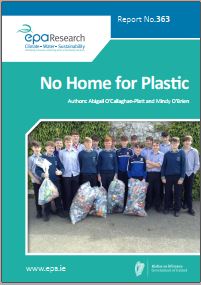Research 363: No Home for Plastic
Authors: Abigail O’Callaghan-Platt and Mindy O’Brien
Summary: Plastic has become a ubiquitous material globally. Research quantifying the amount of plastic in the environment has prompted calls for action to tackle the use of this problem material. Aiming to reduce individual plastic consumption, this research revealed practical barriers to behaviour change including a lack of easy access to plastic-free options, the cost of plastic-free shopping and a lack of information on plastic-free options.

Identifying Pressures
Plastic has become a ubiquitous material globally. Recent research quantifying the amount of plastic in the environment has prompted calls for action to tackle the use of this problem material. Reducing our own plastic use is a small but simple way to tackle this issue on a personal level. To assist households and schools in reducing their plastic use, we developed a citizen science protocol for use in Ireland with the aim of raising awareness of levels of plastic use and leading to a reduction in plastic waste. Two forms of the protocol were developed: one for households and one for schools. The citizen science protocol takes the form of a technology-mediated plastic waste auditing tool, whereby individuals and schools submit data on daily plastic use. Following the audit, participants were supported in changing their habits and reducing their plastic use. The household programme was piloted with 39 households and the education programme was piloted with 15 schools (10 primary and 5 secondary).
Informing Policy
From the perspective of informing policies to reduce individual plastic consumption, the research revealed practical barriers to behaviour change. Barriers include a lack of easy access to plastic-free options, the cost of plastic-free shopping and a lack of information on the availability of plastic-free options, as well as personal barriers such as loyalty to particular items. Any policy aiming to reduce plastic use in the population must focus on removing the barriers to reducing plastic use experienced by the public.
Developing Solutions
Provision of affordable plastic packaging-free items in major supermarkets is required to overcome the barriers experienced in reducing disposable plastic use. The combination of a lack of readily available plastic-free items in major supermarkets where most people shop and the higher price charged for unpackaged goods makes plastic-free shopping an inconvenient and expensive option. With these barriers in place, only the most environmentally committed people with the income to do so will make plastic-free choices. In order to significantly reduce plastic use in Ireland, these two major barriers must be removed.